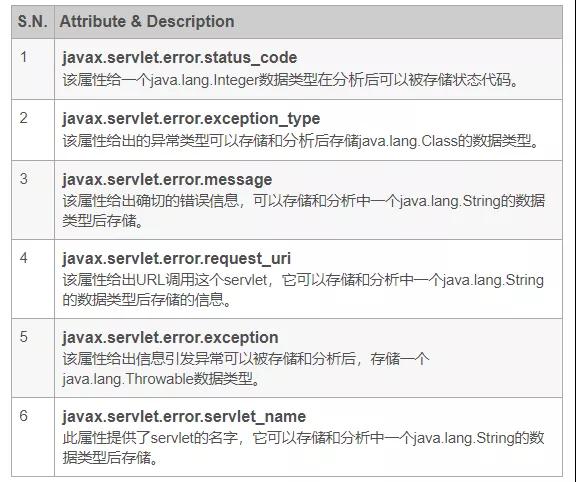| 通常我们在Spring Boot中设置的统一异常处理只能处理Controller抛出的异常。有些请求还没到Controller就出异常了,而这些异常不能被统一异常捕获,例如Servlet容器的某些异常。 |

通常我们在Spring Boot中设置的统一异常处理只能处理Controller抛出的异常。有些请求还没到Controller就出异常了,而这些异常不能被统一异常捕获,例如Servlet容器的某些异常。今天我在项目开发中就遇到了一个,这让我很不爽,因为它返回的错误信息格式不能统一处理,我决定找个方案解决这个问题。

Whitelabel Error Page
这类图相信大家没少见,Spring Boot 只要出错,体现在页面上的就是这个。如果你用Postman之类的测试出了异常则是:
{
"timestamp": "2021-04-29T22:45:33.231+0000",
"status": 500,
"message": "Internal Server Error",
"path": "foo/bar"
}
这个是怎么实现的呢?Spring Boot在启动时会注册一个ErrorPageFilter,当Servlet发生异常时,该过滤器就会拦截处理,将异常根据不同的策略进行处理:当异常已经在处理的话直接处理,否则转发给对应的错误页面。有兴趣的可以去看下源码,逻辑不复杂,这里就不贴了。
另外当一个 Servlet 抛出一个异常时,处理异常的Servlet可以从HttpServletRequest里面得到几个属性,如下:
异常属性
我们可以从上面的几个属性中获取异常的详细信息。
通常Spring Boot出现异常默认会跳转到/error进行处理,而/error的相关逻辑则是由BasicErrorController实现的。
@Controller
@RequestMapping("${server.error.path:${error.path:/error}}")
public class BasicErrorController extends AbstractErrorController {
//返回错误页面
@RequestMapping(produces = MediaType.TEXT_HTML_VALUE)
public ModelAndView errorHtml(HttpServletRequest request, HttpServletResponse response) {
HttpStatus status = getStatus(request);
Map<string, object=""> model = Collections
.unmodifiableMap(getErrorAttributes(request, getErrorAttributeOptions(request, MediaType.TEXT_HTML)));
response.setStatus(status.value());
ModelAndView modelAndView = resolveErrorView(request, response, status, model);
return (modelAndView != null) ? modelAndView : new ModelAndView("error", model);
}
// 返回json
@RequestMapping
public ResponseEntity<map<string, object="">> error(HttpServletRequest request) {
HttpStatus status = getStatus(request);
if (status == HttpStatus.NO_CONTENT) {
return new ResponseEntity<>(status);
}
Map<string, object=""> body = getErrorAttributes(request, getErrorAttributeOptions(request, MediaType.ALL));
return new ResponseEntity<>(body, status);
}
// 其它省略
}
而对应的配置:
@Bean
@ConditionalOnMissingBean(value = ErrorController.class, search = SearchStrategy.CURRENT)
public BasicErrorController basicErrorController(ErrorAttributes errorAttributes,
ObjectProvider errorViewResolvers) {
return new BasicErrorController(errorAttributes, this.serverProperties.getError(),
errorViewResolvers.orderedStream().collect(Collectors.toList()));
}
所以我们只需要重新实现一个ErrorController并注入Spring IoC就可以替代默认的处理机制。而且我们可以很清晰的发现这个BasicErrorController不但是ErrorController的实现而且是一个控制器,如果我们让控制器的方法抛异常,肯定可以被自定义的统一异常处理。所以我对BasicErrorController进行了改造:
@Controller
@RequestMapping("${server.error.path:${error.path:/error}}")
public class ExceptionController extends AbstractErrorController {
public ExceptionController(ErrorAttributes errorAttributes) {
super(errorAttributes);
}
@Override
@Deprecated
public String getErrorPath() {
return null;
}
@RequestMapping(produces = MediaType.TEXT_HTML_VALUE)
public ModelAndView errorHtml(HttpServletRequest request, HttpServletResponse response) {
throw new RuntimeException(getErrorMessage(request));
}
@RequestMapping
public ResponseEntity<map<string, object="">> error(HttpServletRequest request) {
throw new RuntimeException(getErrorMessage(request));
}
private String getErrorMessage(HttpServletRequest request) {
Object code = request.getAttribute("javax.servlet.error.status_code");
Object exceptionType = request.getAttribute("javax.servlet.error.exception_type");
Object message = request.getAttribute("javax.servlet.error.message");
Object path = request.getAttribute("javax.servlet.error.request_uri");
Object exception = request.getAttribute("javax.servlet.error.exception");
return String.format("code: %s,exceptionType: %s,message: %s,path: %s,exception: %s",
code, exceptionType, message, path, exception);
}
}
直接抛异常,简单省力!凡是这里捕捉的到的异常大部分还没有经过Controller,我们通过ExceptionController中继也让这些异常被统一处理,保证整个应用的异常处理对外保持一个统一的门面。
本文地址:https://www.linuxprobe.com/redirection-and-pipeline.html
原文:https://www.cnblogs.com/cainiaoyige1/p/14783638.html